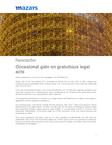
Occasional gain on gratuitous legal acts
Article 302 of the Tax Statute (ET), amended by Article 102 of Law 1607 of 2012, states that occasional gain is generated when, among others, it is in the presence of "any legal act celebrated inter vivos for free".
In the aforementioned provision, prior to the amendment, only inheritances, legacies, donations and what was received as a marital portion were considered as an occasional tax generating event, without mentioning in any way gratuitous acts in general.
The proposed amendment is a novelty in our legal system and deserves an analysis of its scope of application and the subjects covered by it.
As a starting point, it should be clarified that the meaning "inter vivos" refers exclusively to natural persons and not to legal entities. In effect, and although the rule does not distinguish between legal acts celebrated between natural persons, legal entities or a combination of both, a harmonic and systematic interpretation of the same leads us to that conclusion since only natural persons are considered as "alive".
This same expression has been used by our civil legislation to differentiate the acts that are celebrated "inter vivos" from those that happen by "mortis causa" (such as: successions, legacies), being one and the other exclusive of the human orbit since the entities of juridical nature are strictly constituted and liquidated.
This does not mean that legal entities cannot celebrate legal acts, since it is well known that the civil and commercial law grants this capacity to acquire rights and contract obligations (article 633 of the Civil Code).
It is worth noting that the grammatical interpretation indicated in article 27 of the Civil Code is precise in stating that "when the meaning of the law is clear, its literal tenor shall not be disregarded under the pretext of consulting its spirit".
Article 28 ibidem states: "The words of the law shall be understood in their natural and obvious sense, according to the general use of the same words; but when the legislator has expressly defined them for certain matters, they shall be given their legal meaning". (Underlining outside the original text).
Thus, the gratuitous acts entered into by two legal entities (such as the gratuitous bailment contract) are not covered by the rule under study here, without prejudice of being subject to other rules of the TE.
On the contrary, individuals must recognize in the income tax return as occasional gain the economic effects measured in accordance with Article 303 of the ET, of inheritances, legacies, and other gratuitous legal acts such as donations, debt forgiveness, interest-free loans (other than loans between partners/shareholders), gratuitous bailment contracts, civil trusts, among others.


